[Return again...] [Archive] [Pubications] return_links(2); ?>
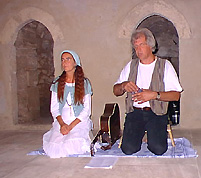

DON'T PRAY FOR ME, PRAY FOR THE TEKKE!
 On September 11 Arienne and Wali vd Zwan were at the Crimea, Ukraine in the 500-year-old Mevlevi tekke. There and then a vision of sharing the Fatiha and the Aramaic Lord's Prayer became a reality.
On September 11 Arienne and Wali vd Zwan were at the Crimea, Ukraine in the 500-year-old Mevlevi tekke. There and then a vision of sharing the Fatiha and the Aramaic Lord's Prayer became a reality.
Compared to the 2,500-year-old history of the town Efpatoria, the tekke is relatively young, but the guardian proudly tells us this is the oldest Mevlevi tekke outside of Turkey. Underneath the floor of the dome-shaped sanctuary are a number of Sufi saints buried, as the story goes. As I strum my guitar the energy is so high I need to brace and earth myself. What a place and what a blessing that we are invited to lead a zikr here!
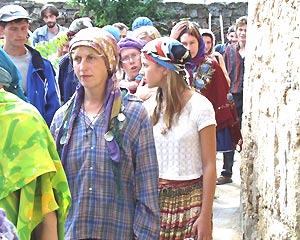 We are in the Crimea to give a weeklong training camp on 'The Unity of Religious Ideals' to some 50 students from all over Russia, Ukraine and even the Baltics. We think we're travelers, but these people spent days in the train to get here in the Crimea at the borders of the Black Sea. It's Thursday and near the end of the training camp. We're invited to the tekke and are leading the group into a series of zikr-type Dances as an introduction to the living experience of Sufism and Islam. Abdu Ghanee, the imam of the local mosque, is also present as the imam of the tekke and he invites us over for the regular weekly service, which is not a Friday, but on a Wednesday. Abdu Ghanee, a man in his thirties who radiates spirituality from every pore of his body, gives us carte blanche on how to perform the service, in keeping with the long Crimean history of Judaism (there are also Aramaic inscriptions all over the place), Christianity and Islam and in keeping with this tradition the weekly service is open to all faiths.
We are in the Crimea to give a weeklong training camp on 'The Unity of Religious Ideals' to some 50 students from all over Russia, Ukraine and even the Baltics. We think we're travelers, but these people spent days in the train to get here in the Crimea at the borders of the Black Sea. It's Thursday and near the end of the training camp. We're invited to the tekke and are leading the group into a series of zikr-type Dances as an introduction to the living experience of Sufism and Islam. Abdu Ghanee, the imam of the local mosque, is also present as the imam of the tekke and he invites us over for the regular weekly service, which is not a Friday, but on a Wednesday. Abdu Ghanee, a man in his thirties who radiates spirituality from every pore of his body, gives us carte blanche on how to perform the service, in keeping with the long Crimean history of Judaism (there are also Aramaic inscriptions all over the place), Christianity and Islam and in keeping with this tradition the weekly service is open to all faiths.
 We don't have to think twice, for next Wednesday is September 11th. All during the training and the following camp we have been offering the Fatiha as an early morning practice to prepare for this day to chant the Fatiha, in keeping with Saadi's wish to use his musical meditation on the Fatiha to the world as a prayer for peace, especially after September 11. We know our students, who learned it at the Dutch Summer Camp, this day will chant this opening prayer of the Qur'an in Amsterdam. At this camp we envisioned peace in the world if we as Westerners would sing the Fatiha and Muslims would sing or Dance the Aramaic Lord's Prayer.
We don't have to think twice, for next Wednesday is September 11th. All during the training and the following camp we have been offering the Fatiha as an early morning practice to prepare for this day to chant the Fatiha, in keeping with Saadi's wish to use his musical meditation on the Fatiha to the world as a prayer for peace, especially after September 11. We know our students, who learned it at the Dutch Summer Camp, this day will chant this opening prayer of the Qur'an in Amsterdam. At this camp we envisioned peace in the world if we as Westerners would sing the Fatiha and Muslims would sing or Dance the Aramaic Lord's Prayer.
 At the tekke we all sit down in a crescent, fifty campers. Some fifteen local Muslims, mainly women, curiously stand somewhat apart. After a short explanation and invocation of Inayat Khan's 'Towards the One' and the Fatiha, we start chanting. The one-and-a-half week of practice pays off. We all sing from the heart - no papers needed - and I know this is what we have worked for. Samuel Lewis says: 'Any problems that or questions that which have no relation to Fatiha or the Lord's prayer are outside my duties in life' (letter-diary March 17th 1963) and I realize how true this is: there are no problems or questions that aren't touched by these prayers!
At the tekke we all sit down in a crescent, fifty campers. Some fifteen local Muslims, mainly women, curiously stand somewhat apart. After a short explanation and invocation of Inayat Khan's 'Towards the One' and the Fatiha, we start chanting. The one-and-a-half week of practice pays off. We all sing from the heart - no papers needed - and I know this is what we have worked for. Samuel Lewis says: 'Any problems that or questions that which have no relation to Fatiha or the Lord's prayer are outside my duties in life' (letter-diary March 17th 1963) and I realize how true this is: there are no problems or questions that aren't touched by these prayers!
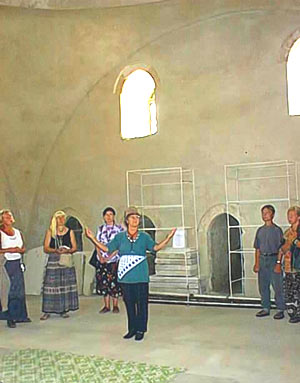 After the prayer Arienne and I don't even have to look at one another, for we both know the Lord's prayer will be next. All join in and our vision is becoming a reality as we dance with our Russian and Ukrainian friends and the local Muslims, who all join us.
After the prayer Arienne and I don't even have to look at one another, for we both know the Lord's prayer will be next. All join in and our vision is becoming a reality as we dance with our Russian and Ukrainian friends and the local Muslims, who all join us.
 After the Dance, we say a word of prayer and invite Abdu Ghanee to close the meeting. He treats us on some beautiful Sura chanting and addresses his community in Russian. Later he explains he told his community we'd always be welcome in this tekke, which is meant for the Universality of religions. He himself might not be there to welcome us, as these are troublesome times. To Arienne and me he explains that his superiors have seen the television broadcasting of our first visit and were strongly against us visiting the tekke a second time, as we 'are not true Muslims'. The price for him inviting us may very well be his job in Efpatoria as imam. We listen to him shocked and at the same time in awe of such surrendering to a greater cause for spiritual liberty. To us he is an example of a true Muslim in the very sense of the word: someone who embodies surrendering. Our eyes meet and I answer that we will remember him in our prayers. His answer is yet another example of surrendering: 'I am not important. Don't pray for me, pray for the tekke.'
After the Dance, we say a word of prayer and invite Abdu Ghanee to close the meeting. He treats us on some beautiful Sura chanting and addresses his community in Russian. Later he explains he told his community we'd always be welcome in this tekke, which is meant for the Universality of religions. He himself might not be there to welcome us, as these are troublesome times. To Arienne and me he explains that his superiors have seen the television broadcasting of our first visit and were strongly against us visiting the tekke a second time, as we 'are not true Muslims'. The price for him inviting us may very well be his job in Efpatoria as imam. We listen to him shocked and at the same time in awe of such surrendering to a greater cause for spiritual liberty. To us he is an example of a true Muslim in the very sense of the word: someone who embodies surrendering. Our eyes meet and I answer that we will remember him in our prayers. His answer is yet another example of surrendering: 'I am not important. Don't pray for me, pray for the tekke.'
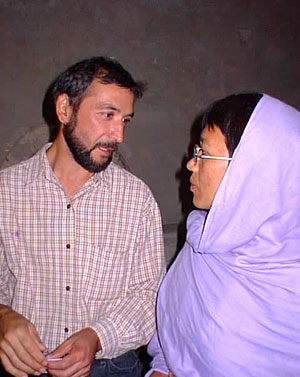 Epilogue:
Epilogue:
It's November and Malika, a Dutch woman who's lived in Russia for several years, joins us for our Dutch training course. She tells us that the Dances gained a lot of interest in the Crimea due to the broadcasting and articles in the local journals of our visit. ?nne and I are 'local celebrities' (which isn't saying much, anyone is who travels to these far away places), but for the imam things turned out worse: he lost his job.
I set to writing this article for We Circle Around and at the same time know I'll ask our Russian friends to translate it into Russian, so it can somehow reach the Efpatorian newspapers, the imam and the tekke.
Wali van der Zwan, Netherlands
On photo: Abdu Ghanee and Shahodat, the organizer of 'Mir' Festival.
Photo by Pasha (aka Seagull) and Ivan.

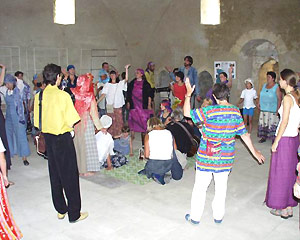

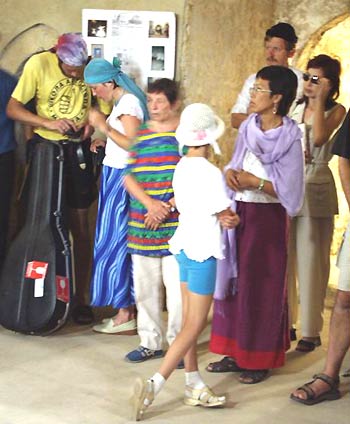
![]()
[Return again...] [Archive] [Pubications]